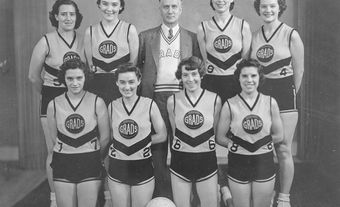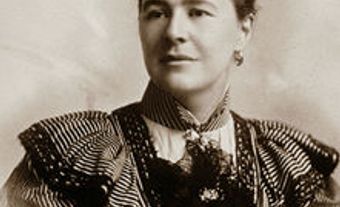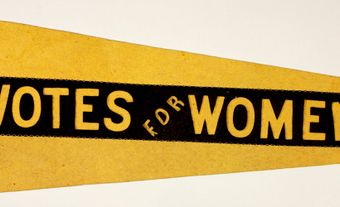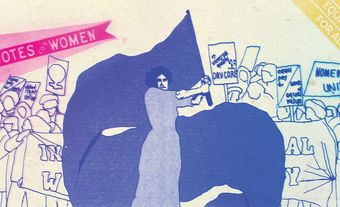Adelaide Sophia Hoodless, nee Hunter, educator and author (born 27 February 1858 in St. George, Ontario; died 26 February 1910 in Toronto, Ontario). Hoodless helped found the Women’s Institute, the Victorian Order of Nurses and the National Council of Women in Canada. A champion of the domestic science movement, she established the first training school for domestic science teachers in Canada and wrote the first Canadian domestic science textbook.

Early Life
Addie Sophia Hunter was born at “The Willows,” her family’s clapboard farmhouse. She was the youngest of the 12 children of David Hunter, who died around the time of her birth, and Jean Hamilton. Addie attended a local one-room schoolhouse for her elementary education then went to live with her married elder sister Elizabeth Charlton and attended Ladies’ College in Cainsville (now part of Brantford and Brant County) for secondary school.
Marriage and Children
On 14 September 1881, Addie married John Hoodless, the son of a Hamilton furniture manufacturer, at Zion Church in Cainsville. The couple settled in Hamilton, Ontario. Upon her marriage, Addie began to use the more formal Adelaide as her first name. At the time of her engagement, Adelaide was concerned about the political and religious differences between herself and her fiancé, confiding in her minister, “Here I am, a strong Presbyterian and a Whig [Liberal], planning to marry a man who is not only an Anglican but a Tory.” Yet the marriage was a happy one and Adelaide later wrote, “he has been most heartily sympathetic.” She later told one of her daughters, “I’d rather ride in a wheelbarrow with a man I loved than a yacht with one I didn’t.”
Adelaide and John Hoodless had four children: Edna Clarkson Bostwick (1882–1946), Joseph Bernard Hoodless (1884–1929), Muriel Adelaide Peck (1886–1955) and John Harold “Jack” Hoodless (1888–89). Jack died in August 1889 at the age of 14 months of what was then called “the summer complaint,” an intestinal blockage caused by drinking contaminated cow’s milk. Adelaide, who may have kept her own cow on the Hoodless family’s property in Hamilton rather than relying on commercial milk deliveries in open containers, blamed herself for her son’s death and was determined to warn other women of the importance of home hygiene, especially in food preparation.
The Canadian National Council of Women
Adelaide Hoodless was an active volunteer in women’s organizations in Hamilton. In 1890, she became the second president of the Hamilton chapter of the Young Women’s Christian Association (YWCA), which was founded in 1873 to provide housing and activities for young women working in the city. In this capacity, Hoodless attended the 1893 Women’s Congress in Chicago, which was held in conjunction with the World’s Fair. Hoodless observed that there were few national Canadian organizations addressing women’s concerns, later explaining to the Hamilton Spectator newspaper, “Canada was about the only country … not officially represented through an official body of women … the Canadian delegates called a meeting then and there to discuss the questions of forming a National Council for Canada.” Hoodless worked with Lady Aberdeen, the wife of Governor General Lord Aberdeen, to create the Canadian National Council of Women that same year. Hoodless also worked with Lady Aberdeen to establish the Victorian Order of Nurses to provide health care in remote communities in honour of Queen Victoria’s Diamond Jubilee in 1897.
Disinterest in Women’s Suffrage
In contrast to Lady Aberdeen, Hoodless did not use her public platform to advocate for women’s suffrage. In 1899, Hoodless argued in an interview with The Philadelphia Record newspaper, “In Canada, women have not the provocation for suffrage agitation that women in the U.S. have” because men and women worked together to address social issues at the municipal level. In 1904, Hoodless stated in a newspaper interview, “a woman who has not succeeded in training her sons to vote so that they will guard their mother’s best interests and the best interests of the nation is not herself worthy to vote.”
Women’s Institutes
In 1897, farmer and teacher Erland Lee attended one of Adelaide Hoodless’s public lectures in Guelph about the importance of education in domestic science. Erland and his wife Janet invited Hoodless to speak to a group of 100 women at Squire’s Hall in Stoney Creek. Hoodless proposed that rural women should have their own organizations equivalent to the Farmers Institutes to provide support and continuing education in domestic science, speaking of the death of her own son from drinking unpasteurized milk. The original Women’s Institute constitution was drawn up on 19 February 1897 at the home of Erland and Janet Lee. Hoodless became honorary president and achieved lasting recognition for her role in developing these organizations. The Women’s Institutes held afternoon “short courses” in domestic science to allow rural women to learn new skills without taking too much time away from their homes and families. Although Hoodless is closely associated with the founding of the Women’s Institutes, a movement that spread across the world, she had little involvement in their administration, leaving these organizations to rural women while she focused on advocating for domestic science education in Ontario public schools.
Domestic Science Education
Adelaide Hoodless delivered hundreds of lectures in support of domestic science education and was employed by the provincial government to promote the introduction of domestic science into public school curriculums. She was an official delegate to the International Council of Women’s Conference in London in 1899, writing articles about the conference for the Toronto Mail and Empire newspaper. With the encouragement of Ontario Minister of Education George William Ross, Hoodless wrote a textbook, Public School Domestic Science, in 1898, which discussed the importance of chemistry and hygiene to food preparation and preservation. Following a large donation from Donald Alexander Smith (later Lord Strathcona), Hoodless founded the first school for the training of domestic science teachers in Canada, the Normal School of Domestic Science and Art in Hamilton in 1900. It soon became part of the Ontario Agricultural College (later the University of Guelph) in 1904.
Hoodless defined domestic science as “the application of scientific principles to the management of the home. It teaches the value of pure air, proper food, systematic management, economy, care of children, domestic and civil sanitation and the prevention of disease.” The domestic science movement of the late 19th century regarded women’s work within the home as a profession equal to the public professions pursued primarily by men at the time. Hoodless argued, “Girls should be educated to fit them properly for the sphere of life to which they are destined, that of homemaking, and this should be done by teaching domestic science in public schools.” Hoodless’s advocacy for domestic science education was controversial at the time because she was viewed as interfering with the management of other people’s homes. Her son Bernard later recalled, “’Let her stay home and take care of her family’ was one of the pieces of advice most often handed out.”
Later Life
In 1900, Adelaide Hoodless was named honorary vice-president of the newly formed Canadian Household Economic Association. Hoodless experienced financial difficulties in the last decade of her life due to the decline of her husband’s furniture business, and she struggled to increase her family’s income by delivering lectures and writing further books about domestic science. In 1910, Hoodless collapsed while giving a lecture at St. Margaret’s College, a private girls’ school in Toronto. She died of a cerebral haemorrhage and is buried in a Hamilton cemetery.
Legacy
Adelaide Hoodless’s birthplace is now the Adelaide Hunter Hoodless Homestead National Historic Site of Canada. There is an Adelaide Hoodless Elementary School in Hamilton and an Adelaide Hoodless Garden in Guelph. The Erland Lee house in Stoney Creek is now a museum owned and maintained by the Federated Women’s Institutes of Ontario.
Historians and biographers debated the impact of Hoodless’s advocacy for domestic science on the status of Canadian women in the mid-1980s. Terry Crowley, who wrote a 1986 article for the Canadian Historical Review about Hoodless’s influence on Canadian girlhood, concluded that “The result of her activities was to make education more gender specific at a time when the movement of women into the workforce had begun to assail accepted sexual norms.” That same year, biographer Cheryl MacDonald argued for a more generous interpretation of Hoodless’s legacy, writing, “She never suggested that women were unsuited to work outside the home. Instead, faced with overwhelming evidence that women spent (and still spend) a large part of their lives raising families and caring for their home, she proposed to make them experts at these tasks.” In 1993, Hoodless appeared on a stamp as part of a series about prominent Canadian women.

 Share on Facebook
Share on Facebook Share on X
Share on X Share by Email
Share by Email Share on Google Classroom
Share on Google Classroom





